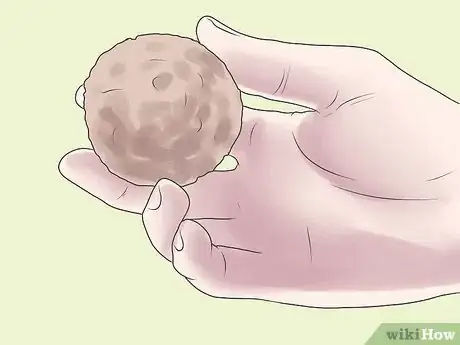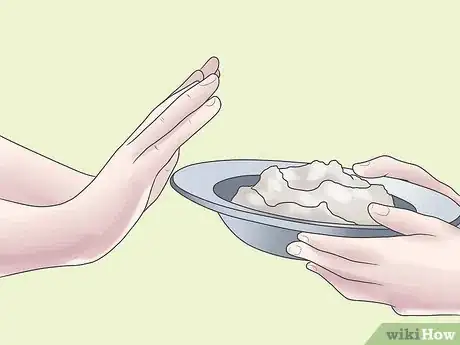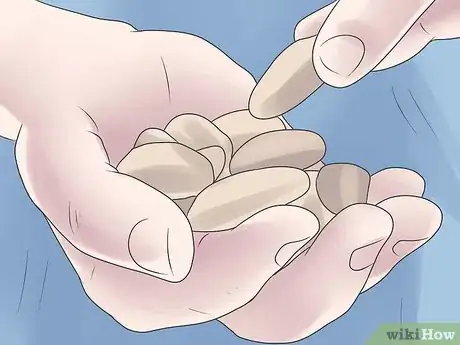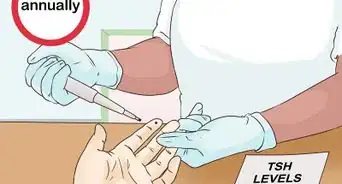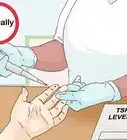This article was medically reviewed by Sarah Gehrke, RN, MS. Sarah Gehrke is a Registered Nurse and Licensed Massage Therapist in Texas. Sarah has over 10 years of experience teaching and practicing phlebotomy and intravenous (IV) therapy using physical, psychological, and emotional support. She received her Massage Therapist License from the Amarillo Massage Therapy Institute in 2008 and a M.S. in Nursing from the University of Phoenix in 2013.
There are 21 references cited in this article, which can be found at the bottom of the page.
wikiHow marks an article as reader-approved once it receives enough positive feedback. This article received 46 testimonials and 100% of readers who voted found it helpful, earning it our reader-approved status.
This article has been viewed 1,163,042 times.
Leptin is a hormone that is generated by the fatty tissue in your body. Your brain reacts to leptin by making you feel full and signaling your body to start burning calories instead of taking them in.[1] But if your brain isn’t sensitive to leptin, you’ll have a tendency to eat more and burn fewer calories in the long run, making you susceptible to weight gain.[2] With a few tweaks to your diet and lifestyle, it is possible to help your body produce a healthy amount of leptin, and to boost your brain’s sensitivity to the leptin that is already in your system.[3]
Steps
Avoiding Foods that Reduce Leptin Sensitivity
-
1Limit your fructose consumption. Fructose inhibits your leptin receptors and makes you less sensitive to the leptin in your system.[4] You may have plenty of leptin in your body, but if it can't be picked up and identified, it won't do you any good. So cut out the fructose—namely, high fructose corn syrup—to let your body do its job.
- Many processed foods contain fructose. The simplest way to reduce your intake is to avoid anything prepackaged.
- If you’re worried about fructose, don’t rush to drop fruit from your diet. While fructose occurs naturally in fruit, the amount that you get from eating fresh fruit is not enough to affect your leptin sensitivity.[5]
-
2Say no to simple carbs. Simple carbs (refined, sugary, and generally white) spike your insulin levels, which in turn leads to insulin resistance and messes with your leptin sensitivity. So white bread, white rice, and all those delicious baked goods that are calling your name are now on the no-no list.
- Darker, unprocessed grains, such as whole oats, quinoa, and some whole wheat pastas tend to have more nutrients. However, be aware that these complex carbs are still carbs, and they can still lead to leptin and insulin resistance if eaten in excess.[6]
- Talk to your doctor or a registered dietitian to determine how many complex carbohydrates you should be eating every day.
Advertisement -
3Avoid severe calorie restriction. Some people will tell you to cut out carbs pretty much entirely. You can do this if you so choose, but be sure not to send your body signals that it's starving. If you're not getting enough nutrients, your body will start shutting down and your hormones will be thrown out of whack. And to top it off, you'll need massive amounts of willpower because you'll be so hungry.
- Yes, losing weight is good for increasing your leptin sensitivity and preventing leptin resistance. When you're at a healthy weight, your hormones usually become more balanced. If you're overweight or obese, it's a good idea to get on a diet plan—just make sure it's healthy, balanced, and something you can maintain for the long-term.
- Talk to a doctor or dietitian about the healthiest way to cut calories out of your diet.
-
4Lower your triglycerides. Eating a diet designed to lower your triglycerides (a type of fatty molecule that circulates in your bloodstream) will also increase your leptin sensitivity.[7] This means cutting back on sugary foods, alcohol, carbs, and saturated and trans fats.[8]
- You can also reduce your triglyceride levels by eating healthy fats (such as the fats found in fish like salmon and tuna), lean proteins, green vegetables, and high-fiber foods like beans, whole grains, and fruit.
-
5Don't yo-yo diet. Seriously. Don't do it. It just messes with your metabolism and messes with your hormones, leaving a permanent mark. And you will probably wind up gaining the weight back and then some! So pick a diet that is sustainable and healthy. Your body can't handle bouts of starvation between bouts of junk.[9]
- Crash dieting is another mistake that hurts you in the long run. Crash diets won’t boost your leptin sensitivity, and are unlikely to help you lose weight. If you do lose the weight, you are likely to gain it back again quickly.
Eating the Right Foods
-
1Eat a protein-packed breakfast. This gets your metabolism going right out of the gate. Your body will be fueled up for the entire day, keeping you feeling fuller, longer. So skip the doughnut and go for eggs and lean meats, along with healthy fats, fruits, and vegetables.[10]
- While cereal is tempting because it’s quick and easy, give it a pass if you can. Cereals made from wheat and other grains are carbohydrates, and they’re full of lectin. Lectin binds to your leptin receptors, keeping the leptin from doing its job.[11]
-
2Eat healthy fats. Healthy fats, such as monounsaturated fats and omega-3 fatty acids, are great for increasing your body's sensitivity to leptin.[12] And they're great for your heart and cholesterol levels, too. So load up on salmon, mackerel, herring, and all that delicious, flaky sea fare. You can also get good fats from healthy vegetable oils (such as olive and canola oil), nuts, and avocados.[13]
-
3Eat lots of leafy greens, fruits, and other veggies. Fruits and veggies (especially ones like spinach, kale, and broccoli) are jam packed with nutrients and yet have few calories. That means you can eat a ton, fill up fast, and not see it on your waistline.
-
4Go for foods high in zinc. Studies have shown that the leptin resistance that often comes with obesity may be the result of a zinc deficiency.[16] It’s possible that zinc can help boost your leptin production. Get more zinc in your diet by loading up on spinach, beef, lamb, seafood, nuts, cocoa, beans, mushrooms, and pumpkin.[17]
Having the Right Lifestyle
-
1Destress. When you’re anxious and stressed out, your body ups its production of the stress hormone, cortisol. That cortisol then messes with how your body deals with other hormones, including leptin. So if relaxing is something you don't remember how to do, make it a point to relearn. Your leptin sensitivity depends on it!
- If it's not already part of your routine, experiment with yoga or meditation. They've both been shown to have relaxing effects, leading to better sleep and lower cortisol levels.
-
2Get some zzz's. This gets straight to the source: sleep regulates your leptin and ghrelin levels (ghrelin is the hormone that tells your body you're hungry).[18] Not enough rest and your body starts producing too much ghrelin. So hit the hay in time to get about 8 hours every night.
- Some studies show that a lack of sleep can cause your body to produce more leptin. However, it also tends to lead to overeating. So while the relationship between sleep and leptin is complicated, poor sleeping habits still increase your risk for obesity in the long run.[19]
- To get better sleep, cut out using electronics a couple hours before bedtime. The light from your TV, computer, or phone screen tells your brain to stay awake. Turn your screens off earlier, and your brain will know it's time to go to bed.
-
3Don't exercise too much. Never thought you'd hear that, huh? But yep—there's such a thing as cardio burnout when it comes to leptin. Too much cardio (the endurance, long-lasting kind) raises cortisol levels, increases oxidative damage, causes systemic inflammation, depresses the immune system, and decreases fat metabolism.[20] None of these things is good for you! So take this as an excuse to skip the gym once in a while and avoid getting too much of a good thing.[21]
- For the record, some cardio is fine for most people. Always talk to your doctor before starting a new exercise program. Work with them to determine the type of exercise that is best for you.
-
4Be sure to exercise a little. While exercising too much can stress your body, leading a sedentary lifestyle isn't good for you, either. So when you do hit the gym, stick to gentle cardio interval training (running for a minute, walking for a minute in 10 or so cycles, for example) and some weightlifting.
- Make it a point to be active naturally and enjoy your exercise. Instead of forcing yourself to go to the gym, go for a hike, go to the swimming pool, or initiate a basketball game with friends. Exercise doesn't have to feel like a chore.
-
5Consider medications. The medications Symlin and Byetta are both designed to help manage the insulin resistance that comes with type 2 diabetes. However, they also have the added benefit of boosting your leptin sensitivity.[22] Leptin resistance and insulin resistance often go together, so if you have one, you may have the other. Talk to your doctor to find out if one of these medications is right for you.
- Your doctor can test your leptin levels. If something's off, they'll be able to see right away. However, the first thing they'll tell you is to work on your diet and your lifestyle; there is no easy way out (like a medication) when it comes to regulating your leptin sensitivity.
Expert Q&A
-
QuestionIs it okay to eat honey if I am trying to increase leptin sensitivity?
 Sarah Gehrke, RN, MSSarah Gehrke is a Registered Nurse and Licensed Massage Therapist in Texas. Sarah has over 10 years of experience teaching and practicing phlebotomy and intravenous (IV) therapy using physical, psychological, and emotional support. She received her Massage Therapist License from the Amarillo Massage Therapy Institute in 2008 and a M.S. in Nursing from the University of Phoenix in 2013.
Sarah Gehrke, RN, MSSarah Gehrke is a Registered Nurse and Licensed Massage Therapist in Texas. Sarah has over 10 years of experience teaching and practicing phlebotomy and intravenous (IV) therapy using physical, psychological, and emotional support. She received her Massage Therapist License from the Amarillo Massage Therapy Institute in 2008 and a M.S. in Nursing from the University of Phoenix in 2013.
Registered Nurse Honey has a high percentage of fructose (it also contains glucose) and is more likely to create leptin issues than glucose alone. So go easy on the honey while you’re trying to increase leptin sensitivity.
Honey has a high percentage of fructose (it also contains glucose) and is more likely to create leptin issues than glucose alone. So go easy on the honey while you’re trying to increase leptin sensitivity. -
QuestionIs there a supplement available on the market with leptin in it?
 Sarah Gehrke, RN, MSSarah Gehrke is a Registered Nurse and Licensed Massage Therapist in Texas. Sarah has over 10 years of experience teaching and practicing phlebotomy and intravenous (IV) therapy using physical, psychological, and emotional support. She received her Massage Therapist License from the Amarillo Massage Therapy Institute in 2008 and a M.S. in Nursing from the University of Phoenix in 2013.
Sarah Gehrke, RN, MSSarah Gehrke is a Registered Nurse and Licensed Massage Therapist in Texas. Sarah has over 10 years of experience teaching and practicing phlebotomy and intravenous (IV) therapy using physical, psychological, and emotional support. She received her Massage Therapist License from the Amarillo Massage Therapy Institute in 2008 and a M.S. in Nursing from the University of Phoenix in 2013.
Registered Nurse Some supplements are marketed as such or may claim to to be a "leptin supplement" -- however, supplements do not contain leptin. Leptin is a protein like chicken or other whole-food protein, and your body would just break it up, so you wouldn’t absorb it from a pill.
Some supplements are marketed as such or may claim to to be a "leptin supplement" -- however, supplements do not contain leptin. Leptin is a protein like chicken or other whole-food protein, and your body would just break it up, so you wouldn’t absorb it from a pill.
Warnings
- Unless you have a condition that impairs your leptin production, it is usually not helpful to take leptin supplements. Focus on increasing your brain’s sensitivity to leptin rather than trying to increase the amount of leptin in your body.[24]⧼thumbs_response⧽
References
- ↑ https://www.ncbi.nlm.nih.gov/pubmed/17212793
- ↑ https://academic.oup.com/jcem/article-lookup/doi/10.1210/jcem.83.1.4494
- ↑ https://blog.bulletproof.com/how-to-reset-your-leptin-sensitivity-and-master-your-metabolism/
- ↑ http://www.marksdailyapple.com/leptin/#axzz1zftxJ9il
- ↑ http://www.marksdailyapple.com/leptin/#axzz1zftxJ9il
- ↑ https://www.ncbi.nlm.nih.gov/pmc/articles/PMC4251481/
- ↑ https://www.ncbi.nlm.nih.gov/pubmed/15111494
- ↑ https://www.umassmed.edu/nutrition/Cardiovascular/handouts/lowering-triglycerides/
- ↑ http://nymag.com/news/sports/38001/index1.html
- ↑ https://www.ncbi.nlm.nih.gov/pmc/articles/PMC4251481/
- ↑ https://www.ncbi.nlm.nih.gov/pubmed/25599185
- ↑ https://www.ncbi.nlm.nih.gov/pmc/articles/PMC4251481/
- ↑ https://www.fitnessmagazine.com/recipes/healthy-eating/tips/why-non-fat-isnt-the-answer/
- ↑ https://www.ncbi.nlm.nih.gov/pubmed/22095115
- ↑ http://www.mayoclinic.org/high-fiber-foods/art-20050948
- ↑ https://www.ncbi.nlm.nih.gov/pubmed/11068958
- ↑ http://www.healthaliciousness.com/articles/zinc.php
- ↑ https://www.ncbi.nlm.nih.gov/pmc/articles/PMC4049314/
- ↑ https://www.ncbi.nlm.nih.gov/pubmed/20453022
- ↑ https://chriskresser.com/why-you-may-need-to-exercise-less/
- ↑ http://www.marksdailyapple.com/chronic-cardio/#axzz2thYSrZwa
- ↑ http://www.webmd.com/diet/features/the-facts-on-leptin-faq
- ↑ http://www.sciencedirect.com/science/article/pii/S0026049514002340
- ↑ http://www.webmd.com/diet/obesity/features/the-facts-on-leptin-faq#3
About This Article
To increase your leptin sensitivity, start by limiting your intake of fructose and simple carbohydrates like sugar and white bread. Next, eat a protein-packed breakfast every day to kickstart your metabolism. Then, incorporate healthy fats, leafy greens, fruits, veggies, and foods high in zinc into your diet. Medications like Symlin and Byetta can also boost your leptin sensitivity, so talk to your doctor to find out if one of these medications is right for you. For exercise tips that can help increase your leptin sensitivity, read on!
